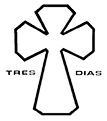GETTING BACK TO THE BASICS OF TRES DIAS
(WHY DO WE DO WHAT WE DO? BECAUSE THERE’S ALWAYS A PRINCIPLE AND A PURPOSE!)
In my time as part of the International Secretariat – since 2002 serving as a Member, Policy Committee Chair and now President, I’ve come to understand two significant things about Tres Dias:
- EVERYTHING done in Tres Dias is purposeful and follows established and tested principles.
and - The majority of Pescadores, including many leaders at the community and international level, do not know or understand many of the reasons and principles behind what we do.
My term as president will be ending in July so I’m going to spend the next few monthly blogs evaluating our current practices in comparison to the vision of the Founders. My hope is that Pescadores will begin to identify those areas where we have strayed from those principles, and perhaps act on them. Let me try to paint a picture over the next few months so you can decide for yourself.
TO BEGIN: Let me start with a brief, simplistic overview of exactly what Tres Dias is, how it works, and why it works:
In the most basic sense, Tres Dias is simply a group of Christians coming together for a 72-hour period in a structured environment – without distractions – with the primary purpose of seeking a closer, more personal relationship with Jesus as our Lord and Savior. This is accomplished using all of the traditional Christan tools: Teaching, fellowship, sharing needs and experiences, praying, praise & worship, sharing Holy Communion and, of course, lots of food and humor. (Most will agree that Christians bond best over food!!) 😊
There are, of course, some additional goals baked into the Tres Dias Method such as creating a desire for servant-leadership, reigniting the desire to reach others, and sending Pescadores back to their churches to help invigorate their brothers and sisters in their love of God. And one of the goals, certainly, is the continuation of Tres Dias as a ministry. These, however, are all by-products of accomplishing the primary goal noted above.
We’ll explore more in future months, but for now I want to focus on the basics of how achieving this goal is accomplished. Essentially there are two parts to the equation:
- US: Our job is nothing more than to create a safe, trusting and non-judgmental environment for the Holy Spirit to do His work in the hearts of the candidates – and certainly in the hearts of the team if they’re receptive. This involves the concept of BALANCE at every level. Two quick examples are:
- Balancing the understanding that emotions are an important component of our relationship with God, but not to the point that they are the driver of that relationship. The team needs to balance the idea of creating an environment that’s conducive to hearing from the Holy Spirit, but not to the point that we can plan the outcome by attempting, consciously or unconsciously, to manipulate emotions using planned events. It truly is a fine and critical balance – and one that I’m concerned we often step over!
- Balancing the need for activities with the need for down-time and reflection. For instance, some communities have so many non-Essential activities planned throughout the day that candidates are unable to process what they might be hearing from the Holy Spirit. Mealtimes are one example: This time should be sacrosanct so candidates have an opportunity to share and develop relationships over meals. If a community feels compelled to add activities at mealtimes, at the very least they should be balanced with other meal or break times where interpersonal relationships can be developed without interruption. In other words, all we need to do is keep in mind that God’s going to do what God’s going to do. And sometimes, the less we do is actually better.
- GOD: Once we create the environment utilizing the various historical tools noted above, the Holy Spirit will most certainly – as we can all attest – meet each of us where we are in the course of the weekend! He knows who’s hurting, seeking, struggling, etc., and He’ll use US to help intervene – if we’re not too busy with our schedule of planned events.
I hope you get the idea! This is my first brush stroke in the picture I want to paint about where we currently are, compared to the vision of the Founders. (By Founders, I’m referring to both the Founders of Cursillo as well as those who created the Protestant version we call Tres Dias).
Although I’ve not completed them, future monthly blogs will likely include topics such as:
- Team Bonding – What is it really?
- The critical role of the Table interactions on a weekend
- Traditions (another example where less is more)
- Critiquing Rollos (why the entire team should be involved)
- Reunion Groups
- Table Chapels (We Prayers)
- Secuelas
- Definition of a Christian
- Respecting denominational differences
- Baptism on weekends
- Role of Spiritual Directors
- Self Determination of Candidates
- Sponsorship
- The role of the local Secretariat
- Etc.
We’ll see how many of these we can fit in between now and when my term ends in July. In the meantime, I’d love to hear your thoughts and suggestions. Please join us on our private Facebook Page (https://facebook.com/groups/tresdiasinternational) so we can continue the conversation.
Until next month.
De Colores!
Jeff Mehl
President
Tres Dias International
